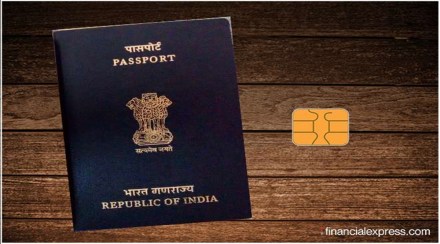The e-passports announced by the Centre will boast advanced security features such as Radio Frequency Identification (RFID) chip. V Muraleedharan, the Union Minister of State for External Affairs, informed the Rajya Sabha today that the chip, embedded in the passport booklet, would digitally store personal identifiers. The rollout of e-passports is likely to begin this year, as announced by Union Finance Minister Nirmala Sitharaman during her Budget speech on Tuesday.
“The ministry is planning to issue chip-enabled e-passports to citizens with advanced security features,” Muraleedharan said in a written reply. “The e-passport features contactless smart card technology, including an embedded Radio Frequency Identification (RFID) chip embedded in the front or back cover or page of the passport.”
Muraleedharan added the “chip characteristics” were in line with International Civil Aviation Organization, a United Nations agency that defined standards for travel documents, guidelines.
“The personal particulars of the applicants would be digitally stored in the chip, which would be embedded in the physical passport booklet,” he said.
“In case, anyone tampers with the chip, the system shall be able to identify it, resulting in the failure of the passport authentication.”
The e-passport will also help to substantially upgrade existing passports and services.
Muraleedharan said 93 Passport Seva Kendras and 428 Post Office Passport Seva Kendras were operational in India.
What is special about e-passports?
The Centre hopes the advanced security features of e-passports would check forgery and also facilitate the immigration process at airports, FE Online had earlier reported.
Attempts to tamper with the chip will be detected by the system and lead to verification failure at the airport. The Centre has already given its approval India Security Press-ISP, Nashik, to procure electronic contactless inlays for e-passports.
Earlier this month, Tata Consultancy Services, which had bagged a second contract to run the Passport Seva Programme, announced that it would introduce e-passports.
Visa processing
In response to a separate question, Muraleedharan said countries such as Canada and the UK had reported longer visa processing during Covid-19.
“While the issuance of visa and visa-related process is the sovereign and unilateral decision of the respective countries, the government emphasises the importance of easier, faster and liberalised visa process for Indian nationals at various levels and in bilateral meetings/forums with foreign countries,” he said.
